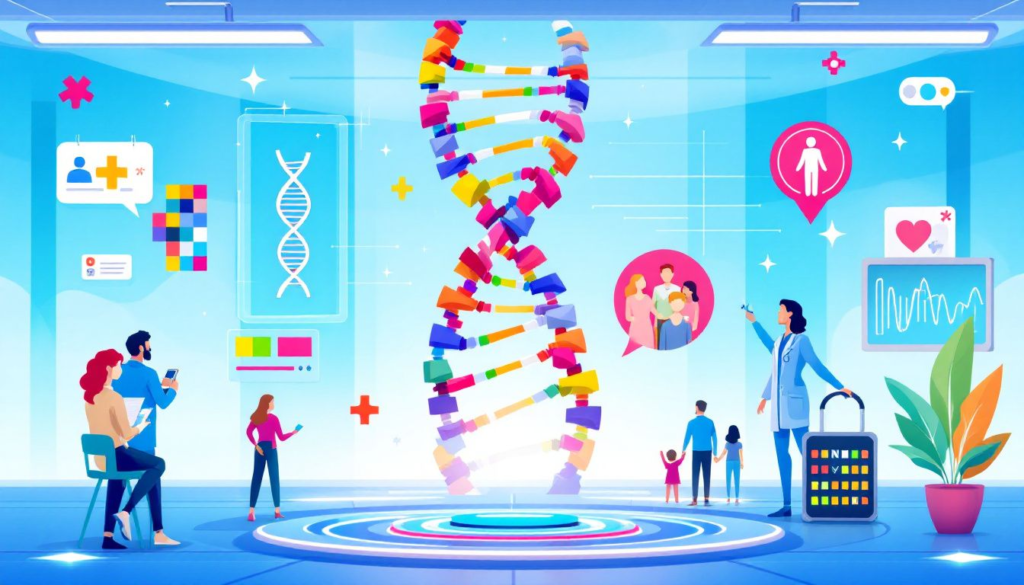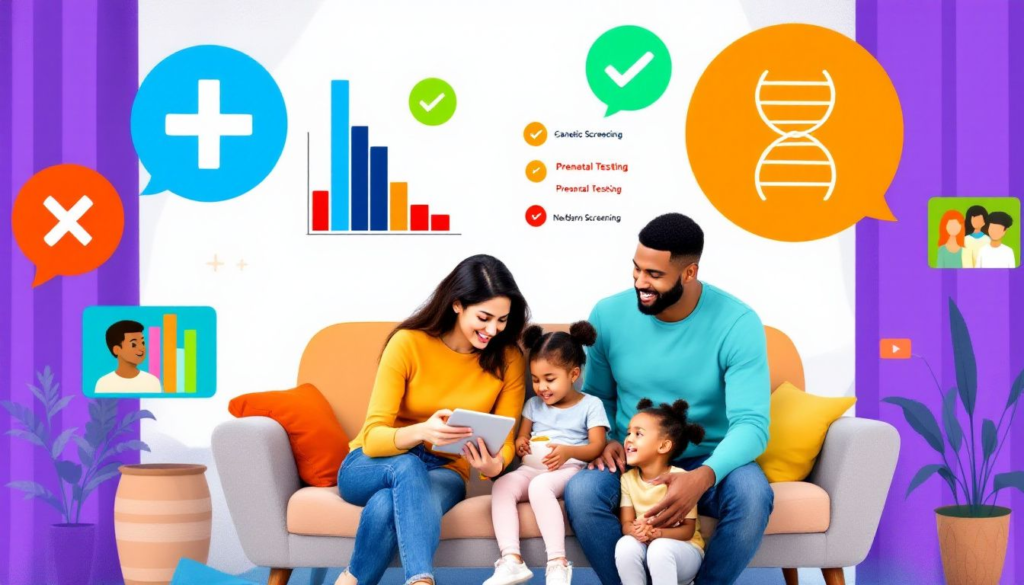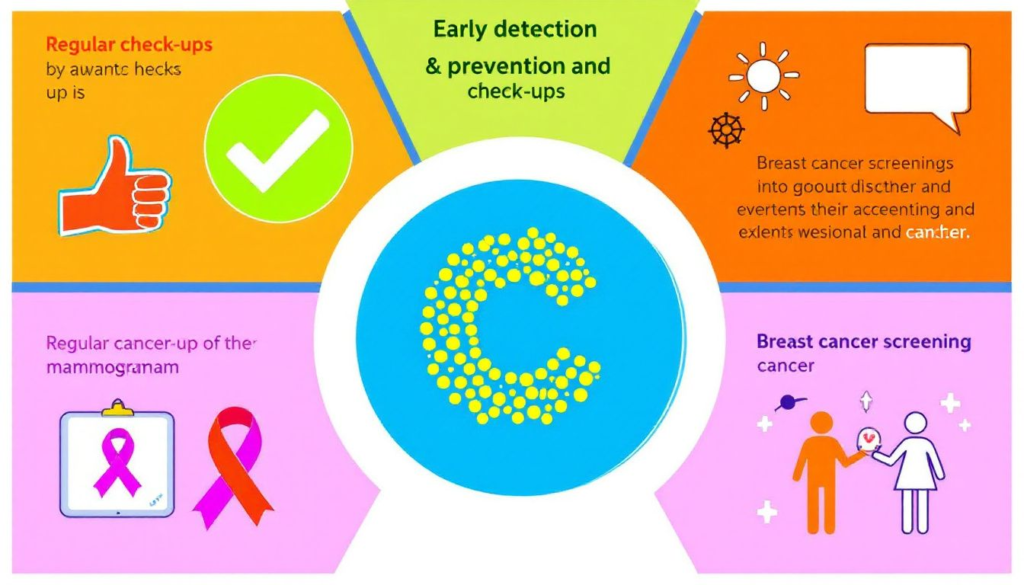Genetic screening unveils DNA changes that can increase your risk for certain diseases. With this knowledge, you can take proactive steps in your health care, customize medical treatments, and make informed family planning decisions. This article delves into the top benefits of genetic screening, from assessing disease risk to crafting personalized health plans.
Key Takeaways
Genetic screening identifies changes in DNA that can indicate genetic diseases and helps assess individual health risks.
Different types of genetic tests, including single gene tests and whole genome sequencing, serve varying purposes in evaluating health conditions.
Genetic counseling is essential for understanding genetic test results, supporting informed medical decisions, and managing the emotional aspects of testing outcomes.
Understanding Genetic Screening

Genetic screening is a powerful method that identifies genetic changes in your DNA that can lead to various genetic diseases. Genetic testing can pinpoint specific alterations in your DNA that might cause illnesses. This process not only assesses your disease risk but can also provide clarity about your genetic makeup.
There are different genetic testing options available, each serving unique purposes. Some tests are direct-to-consumer genetic tests, which you can order without a doctor’s prescription. On the other hand, clinical genetic testing is ordered by healthcare providers for medical reasons and is distinguished by its clinical application. Both types play a crucial role in understanding your genetic risks and health profile.
Genetic test results can sometimes be inconclusive. This typically happens when it is challenging to distinguish between harmful and harmless gene variations. However, when a positive genetic test result is obtained, it indicates the detection of the genetic change being tested for, which can be pivotal for your health management.
Types of Genetic Tests
There is a multitude of genetic tests designed to assess various health conditions, and no single test can detect all genetic disorders, including a genetic disorder. One of the most specific types is single gene tests, which analyze changes in just one gene. These tests are often used for diagnosing conditions like Duchenne muscular dystrophy.
Genetic testing panels analyze several genes simultaneously. They focus on identifying genetic changes across these multiple genes. This type of testing might be recommended if you show symptoms of a disease or have a family history of a genetic condition. These panels provide a broader understanding of your genetic health by examining multiple potential risk factors simultaneously.
Whole genome sequencing offers a more comprehensive analysis. This method includes both exome sequencing and whole genome sequencing to analyze a broad array of genes, identifying potential health-related variants. Such extensive testing can reveal intricate details about your genetic makeup, providing a holistic view of your genetic health.
Disease Risk Assessment
Genetic testing is a cornerstone in assessing your risk of developing certain diseases. Various genetic tests serve different purposes, including diagnostic evaluations and risk assessments. These tests determine your susceptibility to specific health conditions by identifying mutations in your genes.
A significant application of genetic testing is in identifying cancer risks. For instance, individuals diagnosed with cancers like triple-negative breast cancer, ovarian cancer, and colorectal cancer before the age of 50 should consider genetic testing to evaluate their inherited cancer risk. A positive result indicates an increased risk due to identified genetic changes, while a negative result suggests that the risk is likely similar to that of the general population.
Understanding whether you have an inherited harmful genetic change defines what’s known as a hereditary cancer syndrome. This knowledge is critical for proactive health management, allowing you and your healthcare providers to implement preventive measures and closely monitor your health.
Informed Medical Decisions
Receiving genetic test results can significantly impact your sense of control over your health. With awareness of genetic risks, you can make more informed choices about your healthcare. Medical professionals, equipped with your genetic profile, can tailor medical treatments and interventions to best suit your needs.
For individuals identified with a gene mutation linked to hereditary cancers, this information empowers them to take proactive steps such as preventive surgeries or enhanced surveillance. Genetic testing can guide not only medical care but also lifestyle changes to mitigate disease risks based on your risk profile.
After receiving positive genetic test results, it’s crucial to consult with your doctor. This consultation can lead to lifestyle changes and exploring treatment options to reduce disease risk, including the risk to develop breast cancer. Moreover, understanding inherited genetic changes can help select the optimal treatment for conditions like cancer, ensuring a more personalized and effective approach to medical care.
Family Planning and Prenatal Care

Genetic screening plays a pivotal role in family planning and prenatal care by assessing risks for inherited conditions. Carrier testing, for instance, identifies individuals who carry genes for certain genetic disorders, which is vital for making informed family planning decisions. Disorders such as cystic fibrosis, sickle cell disease, and Tay-Sachs can be identified through genetic testing before pregnancy.
Couples identified as carriers of genetic disorders have a 25% chance of having an affected child. Prenatal testing provides crucial information about genetic abnormalities in a developing fetus, giving expectant parents insights into potential genetic disorders or birth defects. Common prenatal genetic tests screen for conditions like Down syndrome and trisomy 13, offering essential information for planning and care.
Additionally, diagnostic tests such as amniocentesis confirm the presence of specific genetic conditions in the fetus. Preconception genetic risk assessments can guide reproductive decisions, enabling better planning and preparation for families. Screening for genetic disorders ultimately leads to improved reproductive outcomes by allowing informed choices.
Personalized Health Management
Personalized medicine leverages your genetic information to tailor prevention, diagnosis, and treatment strategies. Precision medicine utilizes genetic insights to optimize healthcare delivery and improve patient outcomes through customized interventions. Such personalized approaches ensure that your healthcare is uniquely suited to your genetic profile.
Pharmacogenetic testing, for instance, helps determine the most effective medications based on your genetic makeup. Genetic tests can also inform tailored treatment strategies by identifying specific genetic variations that affect disease susceptibility and treatment response. This guidance is instrumental in crafting treatment plans and preventive measures based on inherited disease risks.
Early knowledge of genetic predispositions allows for timely and collaborative healthcare decisions between you and your healthcare providers. Incorporating genetic information, along with your family health history, allows the creation of personalized health management plans to address individual risk factors. Understanding these risks empowers you to adopt proactive health strategies and lifestyle modifications.
Early Detection and Prevention

Genetic testing is a powerful tool for early detection and prevention of diseases. Individuals with a strong family history of colorectal cancer benefit from earlier and more frequent screening to catch potential cancers early. Genetic testing can identify inherited cancer syndromes like Lynch syndrome, which increases the risk for colorectal cancer and necessitates preventive measures.
For those with familial adenomatous polyposis (FAP), screening should begin in childhood due to the high likelihood of developing colorectal cancer. Utilizing genetic information enhances preventive care strategies, allowing healthcare providers to manage patients’ health proactively.
Early detection through genetic screening can be life-saving, providing the opportunity for timely interventions and improved health outcomes.
Emotional and Psychological Benefits
The psychological impact of genetic testing on families dealing with hereditary disorders is significant, underscoring the need for emotional support. Genetic testing can evoke a range of emotional responses, from relief to guilt and difficult decisions. Feelings of responsibility or guilt regarding inherited conditions are common reactions after genetic testing.
A negative result may alleviate anxiety but can also lead to survivor’s guilt if relatives carry risk genes. Acknowledging these emotional responses and seeking appropriate support is crucial.
Genetic counselors play a vital role in managing the emotional aspects of genetic testing and understanding genetic material, providing necessary guidance and support.
Genetic Counseling Support

Genetic counseling is crucial before undergoing genetic testing. Counselors assess your family history and potential inherited cancer risks, ensuring you understand the purpose and outcomes of the test. Genetic counseling helps determine if genetic testing for cancer risk is appropriate based on your individual and family cancer history.
Written informed consent is obtained to ensure you understand the genetic test’s purpose and potential outcomes. Post-testing genetic counseling is equally important, helping you interpret the results and make informed health decisions. Counselors provide guidance on the implications for family members, as genetic risks can extend beyond the individual tested.
Genetic counselors are trained professionals who help manage the emotional aspects associated with genetic testing and results. Their support as a genetic counselor is invaluable in navigating the complexities of genetic information and its impact on your health and family.
Summary
In summary, genetic screening offers numerous benefits, from assessing disease risk to guiding medical decisions, aiding family planning, and personalizing health management. Early detection and prevention, along with emotional and psychological support, are crucial aspects of genetic testing. Genetic counseling plays a vital role in ensuring you understand and effectively use your genetic information.
Consider genetic screening as a proactive step towards better health. By understanding your genetic makeup, you can make informed decisions, adopt preventive measures, and improve your quality of life.
Frequently Asked Questions
Why is genetic screening important?
Genetic screening is crucial as it aids in diagnosing genetic diseases, guiding medical treatment, and informing critical life decisions such as family planning and understanding hereditary risks. Ultimately, it enhances awareness and management of health conditions for individuals and their families.
What is genetic screening?
Genetic screening is a method used to identify genetic alterations in DNA that may predispose individuals to various diseases. This process enables early detection and potential preventive measures for genetic conditions.
What types of genetic tests are available?
There are several types of genetic tests available, including single gene tests, genetic testing panels, and whole genome sequencing, which serve distinct purposes in evaluating genetic information. Each type can provide valuable insights into genetic conditions and predispositions.
How does genetic testing help in disease risk assessment?
Genetic testing plays a crucial role in disease risk assessment by identifying specific mutations linked to health conditions, thereby enabling informed decisions about prevention and management strategies. This proactive approach can significantly enhance your understanding of personal health risks.
What is the role of genetic counseling in genetic testing?
Genetic counseling is essential for understanding the purpose and outcomes of genetic tests, as well as interpreting results and addressing emotional impacts. This support ensures informed decision-making regarding genetic information.

